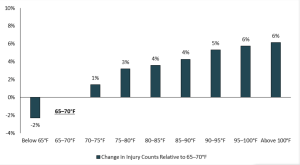The single biggest risk to workers’ comp is heat.
Heat will have more impact on worker safety, injuries, and illness than any other single factor…a risk that will only increase as our planet heats up.

credit WCRI
Aside from a few very recent studies (kudos to WCRI and NCCI) and rare conference sessions the industry has ignored – and continues to ignore – heat.
Politicians have banned local governments from passing laws to protect workers.
Other pols have failed as well; with a very few exceptions states have neglected to pass and governors to sign legislation to protect workers.
Few “Thought leaders” have spoken out to warn their large audiences to protect workers and encourage politicians and regulators to legislate/promulgate regulations to protect workers, or even just to inform employers that claims will increase along with temperatures…kudos to Jeff Rush of CJPIA and LWCC’s Jill Leonard for their efforts.
Outside of WCRI and NCCI, conference planners (NWC’s Michelle Kerr comes to mind) may be the only stakeholder to make an effort – those efforts mostly rewarded with abysmally low attendance at sessions focused on climate change and heat’s impact on worker safety…
The industry has tried mightily to reform its image; Kids’ Chance, injured worker advocacy, behavioral health and addiction treatment support efforts have gone a long way to strengthen the brand…but all that good will melt away unless the industry’s thought leaders, regulators, employers and insurers do the right thing.
Hypocrisy is “Virtue signaling” while actively and purposely ignoring/discounting what heat will do to workers.
What does this mean for you?
Increasing heat means more kids will need a “chance”.
WCRI’s webinar discussing their research on heat is today



Joe,
I appreciate the continued focus on heat and the impact it has on people and the system. Public Citizen has posted a fact sheet on the topic as well, https://www.citizen.org/article/factsheet-bill-to-protect-workers-from-heat-stress/. OSHA is attempting to address, but unfortunately even the simplest of worker protections takes too many cycles for those working in these harsh conditions. Risk Departments and Underwriters could have an outsized impact on incentivizing better conditions through periodic inspections, education on experience rating impacts and policy discounts. The solutions are not overly burdensome (breaks, shade, and hydration) for employers, mostly a combination of common sense and decency.
Thanks for all you do, stay cool.
cb
Thanks for your thoughts and ideas Chad.
Be well Joe